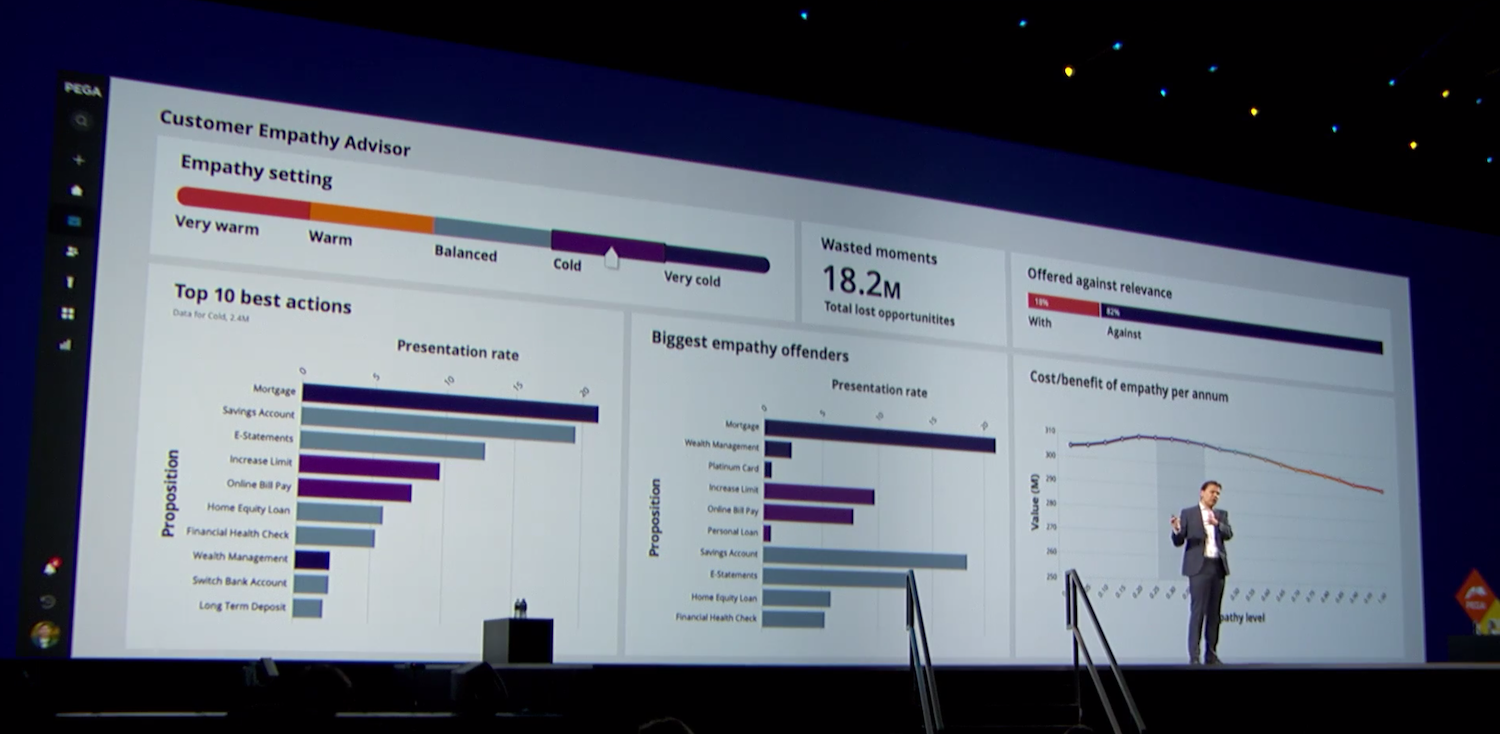
Emotional triggers for a more impactful customer experience
June 22, 2019
Why do we not see more people with disabilities in the hospitality or service industries?
July 1, 2019Becoming more empathetic can be hard. Pega’s new AI-powered Customer Empathy Advisor aims to help – Interview with Rob Walker of Pega
Today’s interview is with Dr. Rob F. Walker, Vice President Decision Management and Analytics at Pega. I caught up with Rob at Pega’s recent customer event, Pegaworld, in Las Vegas and we grabbed a few minutes to talk about his keynote presentation, Pega’s upcoming Customer Empathy Advisor, what empathy is and the value of being more empathetic in customer experience.
This interview follows on from my recent interview – The good, the bad and the ugly of customer service – Interview with Tom Libretto of Pega – and is number 306 in the series of interviews with authors and business leaders that are doing great things, providing valuable insights, helping businesses innovate and delivering great service and experience to both their customers and their employees.
Here’s the highlights of my chat with Rob:
- You can watch Rob’s keynote at Pegaworld here.
- I’ve talked to Rob a number of times before.
- We have talked about next best action strategies, transparency in AI and now we are discussing empathy.
- However, our conversations have always been about the over-arching topic and pursuit of customer engagement.
- The companies that Pega works with are typically Fortune 500 companies and, as such, they see a lot of customer data. That puts them in a position to really understand and measure the impact of what they would call empathy.
- They define empathy as understanding what would happen if companies put themselves in their customers shoes. What is the value and the suitability to the customer of what you are proposing to do (i.e. how appropriate is it?)?
- Many people are talking about the empathy deficit that exists between customers and companies.
- However, given Pega has access to millions and billions of data points they can see and measure the impact of empathic strategies on company performance.
- This is brought to life in the Customer Empathy Advisor, a new feature that Pega has developed as part of their platform, that will be released at the end of this year/beginning of next.
- Here’s some more detail on Pega’s Customer Empathy Advisor and how they do that.
- First, Pega’s machine learning capabilities analyzes the organization’s marketing, sales, and service strategies to assess their current level of empathy.

This image shows a client using the Customer Empathy Advisor – a new capability of Pega® Customer Decision Hub that helps companies use AI to build more sustainable customer relationships. The client is adjusting the empathy levels on a marketing campaign strategy and is watching how the change may impact revenues.
- The Customer Empathy Advisor dashboard (see image above) breaks down the different elements of empathy applied within each strategy into different categories, including:
- Relevance: Is the action, offer, or suggestion of interest to the customer?
- Suitability: Will it likely cause harm to the customer?
- Value: Will the customer likely benefit from it?
- Context: Is it consistent with the customer’s recent activity?
- Intent: Does it take into account the customer’s likely goals?
- Mood: Does it align with the customer’s current frame of mind?
- Via a slider, professionals can quickly see the impact of their chosen strategy on their customers, make adjustments so that they can choose which actions would achieve the best return based on their objectives and KPIs.
- Next, the Customer Empathy Advisor can also predict the Return on Empathy (ROE) and how more (or less) empathetic strategies will have on their bottom line. They do that by analyzing a number of factors including:
- Value to company: Is the action, offer, or suggestion likely to increase the customer’s lifetime value?
- Risk to company: Will it likely cause customer churn or increase exposure to risk?
- Compliance: Is it deliberately misselling a product or unable to explain it?
- All of this allows companies to optimize the empathy levels in their strategy so that they are best suited to the needs of each customer, which in some case may mean taking no action at all.
- Responding to the accusation that some AI systems can be biased, Rob says that their technology, with the Customer Empathy Advisor in place, is always learning from customer data and customer actions about what works and what does not work all the way down to the individual customer. This is hyper personalization.
- That in itself helps remove any inherent bias as the system is always learning about what works and what does not for each individual customer.
- As a result, companies will be able to individualize their offers, service and experience to individual customers because what is appropriate or creepy to me is not the same for you.
- Given that companies will be able to see the impact of their strategies on their customers, this has the power to make organizations more empathetic.
- This does not mean that all companies will choose to be completely empathetic to their customers all of the time. No. But, it will enable companies to make choices and see the impact and opportunity cost of their choices.
- Empathy is not about just being nice. It’s about having better relationships.
- Pega really believe that companies are much much more successful if they are one to one in how they operate with their customers. And, one to one customer engagement is inherently more empathetic.
- Rob’s two punk words: Radical and experimental.
- Find out more about Pega’s Customer Empathy Advisor here
About Rob

Dr. Rob F. Walker is Vice President Decision Management and Analytics at Pegasystems with responsibility for thought leadership, strategic direction and market share of Pega’s decisioning technology and related applications. Rob is one of the world’s foremost experts in the areas of omni-channel customer engagement and front-office decisioning. His vision for Next-Best-Action and 1-to-1 marketing has gained broad market acceptance and adoption among some of the world’s leading brands. He is frequently called upon to speak with global audiences, the media, and Fortune 1000 executives about using data to increase the value of customer relationships.
Prior to the acquisition of Chordiant by Pegasystems in April 2010, Rob was responsible for managing the strategic direction and development of Chordiant’s industry-leading predictive decisioning technologies. As a member of the office of the CTO Rob also provided support to Chordiant’s global sales activities and partnership initiatives. He joined Chordiant when the company he co-founded in 2000, KiQ Ltd., was acquired by Chordiant in December of 2004. KiQ was a specialist provider of decision management and predictive analytics software.
Prior to KiQ, Rob spent eight years in positions of increasing responsibility with leading global information technology consulting firm Capgemini. From 1999-2000, he served as Program Director for Capgemini during which time he was responsible for the creation, development and evangelization of technological innovations in the areas of business intelligence and predictive analytics.
Rob holds a Ph.D. in Computer Science from Vrije Universiteit in the Netherlands.
Check out Pegasystems, find out more about Pega’s Customer Empathy Advisor here, say Hi to them on Twitter @pega and connect with Rob on LinkedIn here.
..
..




